The educational materials listed on this page are about Soil Management.
Soil management encompasses a number of strategies used by farmers and ranchers to protect soil resources, one of their most valuable assets. By practicing soil conservation, including appropriate soil preparation methods, they reduce soil erosion and increase soil stabilization. These soil conservation methods allow for healthy soil formation, soil fertility and favorable soil composition, including soil permeability and soil porosity, which lead to increased soil health. Soil organic matter is a critical component of soil health. Cover crops can help maintain or increase soil organic matter. By using a variety of soil management practices, soil organic matter will increase while soil erosion will decrease, keeping soil nutrients on the farm. Farmers typically use a soil analysis, or soil sampling procedure, to determine what inputs are needed. Key practices include composting, soil chemistry, nutrient mineralization, soil quality/health, organic matter, cover crops, green manures, soil analysis, soil microbiology, soil physics.
Showing 1-13 of 13 results

Optimizing Nutrient and Water Management for Organic Mixed Vegetable Production Systems
These videos feature farmers in Florida who share their practices and experiences when it comes to managing nutrients and water in organic systems. Impact of clay amendments on nutrient and water management This video showcases the impacts of clay amendments on nutrient and water management at Siembra Farm, located near Gainesville, Fla. Grazing cover crops […]

Soil for Water
This series of 11 semi-structured interviews was carried out by Virginia Tech and Virginia Cooperative Extension to better understand farmers’ and ranchers’ agroecological motivations and values related to the protection and conservation of water resources. The series highlights diverse farms of Virginia’s agricultural community through a narrative inquiry framework. Introduction to the Soil for Water […]
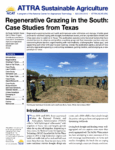
Regenerative Grazing in the South: Case Studies from Texas, Arkansas, Mississippi and Virginia
A multistate team lead by the National Center for Appropriate Technology developed the following series of rancher profiles as part of a larger project to promote regenerative grazing and soil health throughout the South. Case Studies from Texas This publication explains historical factors that have created barriers to adoption and profiles a working group and […]
Desinfestación Anaeróbica del Suelo para Mejorar la Salud de las Plantas de Tomate
Esta publicación explica cómo utilizar la desinfestación anaeróbica del suelo para el manejo de plagas en tomates. Also available in English.
Anaerobic Soil Disinfestation to Advance Tomato Plant Health
This NC State fact sheet discusses the use of anaerobic soil disinfestation (ASD), also known as biological soil disinfestation (BSD), for managing several soil-borne pathogens, plant-parasitic nematodes, and weeds in vegetable and fruit crops. También disponible en español.
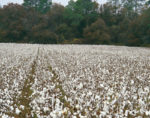
Sustainable Upland Cotton Production
This project developed a set of 12 video training tools to enhance skills and knowledge about sustainable cotton production for Cooperative Extension agents. The 12 videos are listed below. They were created by a team from Texas A&M University, Louisiana State University, and Oklahoma State University. Cotton Growth and Development Beltwide Seed Quality Survey Basic Soil […]
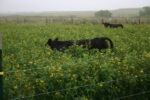
Grazing Cover Crops in Cropland
For some producers with extensive experience using cover crops, grazing can be a ‘next step’ in obtaining additional economic value while achieving environmental stewardship.
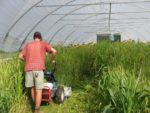
Soil Management Using Cover Crops in Organically Managed High Tunnels
In southern climates, high tunnels are typically used for season extension in the spring, fall, and winter. In the hot summer months, if no shade cloth is used to cover high tunnels, it can be difficult to grow anything but the most heat tolerant crops, and it can be uncomfortable to work in tunnels due to the heat. This is an excellent time to incorporate a cover crop, between the late spring and early fall crops. Many cover crops species are adapted to hot southern summers and perform well in high tunnels.
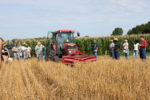
Equipment Demonstration and Conservation Systems Overview
Conservation tillage combined with high residue cover crops (Conservation Systems) can maximize residue production and minimize residue decomposition to promote the increase in organic matter across degraded soils of the Southeast, despite climatic conditions.

Evaluating Nutrient, Soil Health, and Economic Benefits of Compost Additions to Summer Cover Crops for Strawberries in North Carolina
Over the past 8 years, a team of multidisciplinary faculty and students at NC State University have conducted various field-based studies at the Center for Environmental Farming Systems (CEFS) and on-farm research examining the impact of summer cover crops, compost additions and applications of beneficial arbuscular mycorrhizal fungi and vermicompost on soil health, nutrient availability, and yields in conventional and organic strawberry production systems.
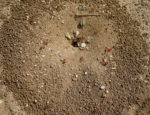
Cover Crops and Soil Biology: What Do We Know?
Investigating soil biology is a wild, unpredictable zoological ride. From the smallest organisms on Earth (viruses) to earthworms, cover crop selection and management is affected by and influences soil biology in ways we cannot completely predict.

Cover Crop Establishment and Residue Management
Benefits associated with cover crops that may include erosion control, increased organic matter, increased water infiltration, and weed suppression are all typically enhanced as biomass levels increase. In order to ensure adequate levels of biomass, growers should recognize the importance of cover crop establishment.
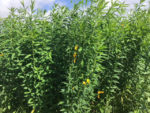
Annual Cover Crops in Florida Vegetable Systems
Fact sheet series from the University of Florida IFAS Extension on integrating cover crops in vegetable production systems in Florida.